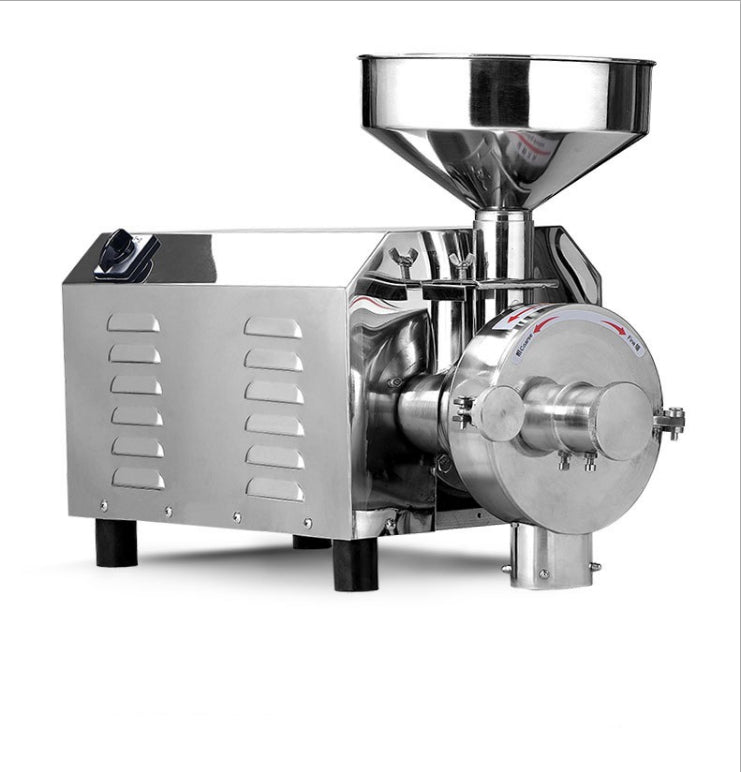A Starter's Guide to Industrial Coffee Grinder Models
A Starter's Guide to Industrial Coffee Grinder Models
Blog Article
Industrial Coffee Mill Overview: Boost Performance and Quality
In the affordable landscape of coffee manufacturing, choosing the ideal commercial coffee mill plays an essential function in improving both performance and item high quality. Understanding the subtleties of different mill types and vital features-- such as customizable grind settings and robust building and construction-- can dramatically influence the final flavor profile of the coffee.
Recognizing Grinder Kinds
When picking a commercial coffee grinder, understanding the various kinds offered is crucial for optimizing both taste extraction and functional efficiency. The 2 main sorts of mills are blade mills and burr mills. Blade mills use sharp blades that slice coffee beans into irregular dimensions, causing irregular extraction and possibly unwanted flavors. While blade grinders are often extra budget-friendly and ideal for small operations, they are typically not suggested for industrial usage.

Eventually, choosing the ideal sort of grinder is indispensable to keeping quality and performance in coffee manufacturing, making it imperative for companies to spend in premium burr grinders for ideal results.
Key Attributes to Take Into Consideration
Choosing a commercial coffee grinder needs careful consideration of several essential attributes that can substantially influence both performance and the overall coffee experience. Among the key facets to examine is the grinding system. Burr grinders are normally liked over blade grinders, as they offer a regular grind dimension, which is important for ideal removal and taste.
Another essential function is the mill's capacity. A flexible mill with numerous setups allows you to tailor the work size to various brewing techniques, enhancing the coffee's taste profile.
Review the mill's sound level, especially in a hectic coffee shop or manufacturing atmosphere, where too much noise can be disruptive. Investing in a mill that balances these features can considerably improve both operational effectiveness and the high quality of the coffee offered.
Optimizing Grinding Process
To accomplish the ideal results in coffee prep work, optimizing the grinding procedure is important. The work dimension dramatically affects removal, taste, and overall top quality of the made coffee. Various developing methods call for particular grind sizes; for visit this site right here instance, espresso click resources requires a great work, while French press demands a coarse texture. Understanding the connection between grind size and brewing technique is the initial action in optimization.


Additionally, keeping an eye on the grinding speed can optimize the process. Slower grinding typically creates much less heat, protecting delicate tastes and fragrances. Alternatively, much faster grinding might generate excessive warmth, adversely affecting the coffee's quality.
Upkeep and Care Tips
Correct upkeep and treatment of commercial coffee grinders are essential for ensuring optimal performance and long life. Regular cleansing is the structure of upkeep; residue build-up can influence taste and grinding efficiency. It is recommended to cleanse the mill after each usage, wiping down the exterior and eliminating any coffee grounds from the burrs.
Furthermore, check the grinding burrs for wear and tear. Dull burrs can endanger work consistency, so they should be changed as essential. Industrial Coffee Grinder. Periodically adjusting the grinder is additionally essential, as this preserves the wanted grind dimension for numerous brewing methods
Lubrication of relocating parts need to be executed according to the manufacturer's requirements, as this minimizes rubbing and lengthens the life of the tools. It is important to make use of food-grade lubricants to make certain safety and conformity with health and wellness laws.
Lastly, maintain the mill in a dry and secure environment to prevent corrosion and deterioration. By sticking to these upkeep and care suggestions, drivers can improve the efficiency of their commercial coffee mills while making sure high-quality outcome and prolonged functional life.
Return on Investment Analysis
Evaluating the roi (ROI) for industrial coffee grinders is essential for companies seeking to maximize their coffee production capabilities. A complete ROI analysis assists establish the economic viability of purchasing top notch mills, permitting services to consider the initial costs versus potential gains.
Examine the acquisition price of the grinder, consisting of installment and any kind of required alterations to existing infrastructure. High-performance grinders frequently lead to decreased grinding time and increased throughput, which can significantly boost productivity.
In addition, consider the influence on item high quality. Industrial Coffee Grinder. Superior grinders yield an even more regular grind dimension, which can improve flavor profiles and client fulfillment, inevitably driving sales. By raising the high quality of the end product, organizations can validate higher prices, bring about raised revenue
Conclusion
In summary, an industrial coffee grinder plays a critical duty in improving both efficiency and item high quality within coffee manufacturing. Inevitably, the tactical financial see page investment in a reliable mill contributes substantially to improved revenue and competitiveness in the coffee industry.
In the affordable landscape of coffee manufacturing, selecting the ideal commercial coffee grinder plays a crucial role in boosting both efficiency and product top quality. The 2 main kinds of grinders are blade mills and burr mills. Within the burr grinder group, there are level burr mills and conical burr mills, each with its benefits. Burr mills are normally preferred over blade mills, as they supply a constant grind dimension, which is important for optimal extraction and flavor.
In recap, a commercial coffee grinder plays a pivotal duty in enhancing both effectiveness and product high quality within coffee production.
Report this page